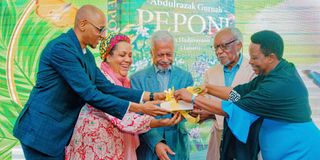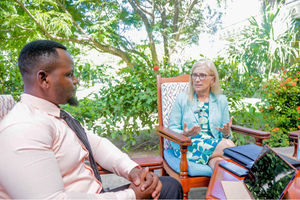Prime
Abdulrazak Gurnah brings ‘Paradise’ back home to Tanzania

Permanent Secretary in the ministry of Education, Catherine Nombo (right), launches Peponi, a Swahili translation of Abdulrazak Gurnah’s Paradise. Others, from left, are the managing director of Mkuki Na Nyota Publishers, Mkuki Bgoya, translator of Paradise, Ida Hadjivayanis, Nobel Prize Laureate, Gurnah, and former managing director and founder of Mkuki Na Nyota, Walter Bgoya. PHOTO | COURTESY
What you need to know:
- Gurnah, a Tanzanian-born British novelist and academic, said Paradise takes him back to the dawn of his career, which spans over 40 years.
Dar es Salaam. Abdulrazak Gurnah formally brought Paradise home as he launched the novel’s Swahili-translated version (Peponi) on Tuesday.
The 2021 Nobel Prize in Literature winner introduced the Swahili version, which was translated by Ida Hadjivayanis and published by Mkuki Na Nyota, at an event that was graced by the US ambassador to Tanzania, Michael Battle, the Ambassador of France to Tanzania, Nabil Hajlaoui, the Permanent Secretary of the Ministry of Education, Catherine Nombo, and luminaries in the Tanzanian literature world.
Gurnah, a Tanzanian-born British novelist and academic, said Paradise takes him back to the dawn of his career, which spans over 40 years.
“I became a writer after noticing that I didn’t see myself in the books that were written by other African writers and authors across the world. I didn’t see us,” he noted.
“Through my writing, I was able to change that. This is my first novel to be translated into an African language, and I’m glad that this particular language is Swahili. It’s a wonderful translation,” he added.
Ms Hadjivayanis, who teaches Swahili Studies at the School of Oriental and African Studies (University of London), said she began to translate Mr Gurnah’s Paradise novel in March 2021.
Six months later, Mr Gurnah won the Nobel Prize in Literature.
“I chose to translate Paradise because it’s a novel that talks about East Africans in complicities. It’s a story that, as I began to translate it, I envisioned being read by us in the language we know best,” she said.
Ms Nombo, who was representing Minister of Education Adolf Mkenda, said the novel Peponi will be processed and adopted by the government in schools.
“These are the stories that deserve to be read by students because they are made of our history and culture, which are well captured by the words of authors like Mr Gurnah,” she said.
Speaking to The Citizen on the sidelines of the event, Prof Issa Shivji underscored the importance of publishing local stories, as it is through these narratives that Tanzania can rekindle its reading culture.
“The presence of social media has got rid of the reading culture in terms of physical books, however, the publications of these writings can bring back this culture, especially in Tanzania,” he explained.
Paradise is a story about a poor young man caught by circumstance and misfortune in pre-World War I Tanganyika and Congo.




